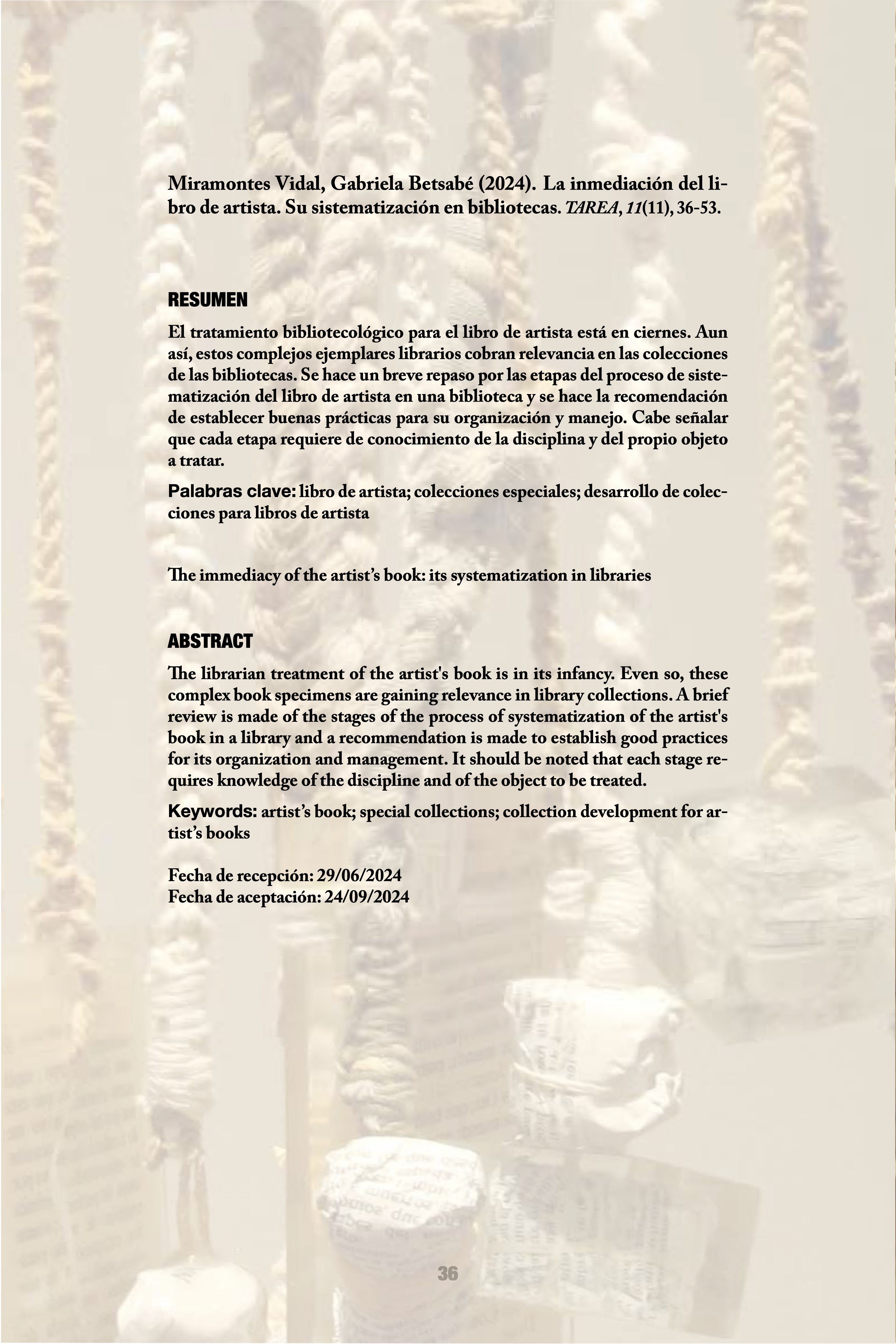The immediacy of the artist’s book
Its systematization in libraries
Keywords:
Artist’s book, Special collections, Collection development for artist’s booksAbstract
The librarian treatment of the artist's book is in its infancy. Even so, these complex book specimens are gaining relevance in library collections. A brief review is made of the stages of the process of systematization of the artist's book in a library and a recommendation is made to establish good practices for its organization and management. It should be noted that each stage requires knowledge of the discipline and of the object to be treated.
References
Adcock, E. P. (2000). IFLA. Principios para el cuidado y manejo de los materiales de las bibliotecas. DIBAM.
Alonso, G., y Medici, M. (2014). Indicadores UNESCO de cultura para el desarrollo: guía de implementación. https://unesdoc.unesco.org/ark:/48223/pf0000232374_spa
American Library Association. (2008). Tesauro de la RBMS. https://www.rbms.info/vocabularies/genre/tr137.htm
Baca, M., Harpring, P., Lanzing, E., McRae, L., y Whiteside, A. B. (2006). Cataloging Cultural Objects: a guide to describing cultural Works and their image. American Library Association.
Baker, C. A., y Silverman, R. (2005). Misperceptions about white gloves. International Preservation news, (37), 4-5. http://www.csntm.org/Content/PageImages/Media/Pages/About/Digitizing/IPN%2037%20Misconceptions%20About%20White%20Gloves.pdf
Benjamin, W.et. al. (2008). La obra de arte en la época de su reproductibilidad técnica. En Obras. Libro 1 (Vol 2). Abada.
Escamilla, G. (1978). Lista de encabezamientos de materia. Universidad Nacional Autónoma de México, Instituto de Investigaciones Bibliográficas.
Escamilla, G. (1981). Manual de catalogación descriptiva. CONACYT.
De Ezcurdia y Vértiz, M., y Maass Moreno, M. (1987). Las colecciones especiales, Secretaría de Educación Pública.
Hernández Hernández, F. (2002). El patrimonio cultural: la memoria recuperada. En Biblioteconomía y administración cultural. Trea.
Haider, S. (2015). Librarianship studies & information technology, (blog). https://librarianshipstudies.blogspot.mx/2015/05/cataloging-glossary-library.html
Hubbard, M. A., y Myers, A. K. D. (2010). Bringing Rare Books to Light: The State of the Profession. RBM: A Journal of Rare Books, Manuscripts, and Cultural Heritage, 11(2), 134-151. https://doi.org/10.5860/rbm.11.2.337
Kroeger, T. (1903). The care of books. Public library, (8).
Miramontes Vidal, G. B. (2020). Conceptualización y tratamiento bibliotecológico del libro de artista [Tesis de doctorado en bibliotecología y estudios de la información]. Universidad Nacional Autónoma de México.
–––. (2010). La encuadernación en México en el siglo XVII, una forma de conservación. [Tesis de maestría en bibliotecología y estudios de la información]. Universidad Nacional Autónoma de México.
Myers, A. K. D., y Myers, W. A. (2014). Opening Artists’ Books to the User: An Example with Potential Approaches. RBM A Journal of Rare Books Manuscripts and Cultural Heritage, 15(1), 56-67.
Pastor-Sánchez, J. A. (2016). Quince años de web semántica: de las tecnologías a las buenas prácticas. Anuario ThinkEPI, (10), 264-268. https://doi.org/10.3145/thinkepi.2016.58
Pickwoad, N. (2000). Museums of the Book. En A. Chapman, y F. C. Lynden (Eds.), Advances in Librarianship, 24. Academic Press.
Rogers, R. R. (2007). Collecting Artists’ Books: One Librarian’s Path from Angst to Enlightenment. The Bonefolder: an e-journal for the bookbinder and book artist, 4(1), 9-14. https://philobiblon.com/bonefolder/BonefolderVol4No1.pdf
Tyckoson, D. (2003). On the Desirableness of Personal Relations between Librarians and Readers: The Past and Future of Reference Service. Reference Services Review, 31(1), 12-16. https://doi.org/10.1108/00907320310460834
Universidad de las Artes de Londres. Tesauro de términos de encuadernación. https://www.ligatus.org.uk/lob/aae/help
Visual Resources Association. (2006). Cataloging Cultural Objects. https://static1.squarespace.com/static/64839bcb007bd907faf40da2/t/648682731ae85c00320c7d13/1686536835929/CatalogingCulturalObjectsFullv2.pdf
Visual Resources Association. (2007). Element Description. https://www.loc.gov/standards/vracore/VRA_Core4_Element_Description.pdf
Visual Resources Association. (2010). Standard VRA. http://www.core.vraweb.org/pdfs/VRACore4FAQ.pdf
Whittaker, B. M. (2006). “Get It, Catalog It, Promote It”: New Challenges to Providing Access to Special Collections. RBM: A Journal of Rare Books, Manuscripts, and Cultural Heritage 7(2), 121-133. https://doi.org/10.5860/rbm.7.2.266
Whittaker, B. M., y L. M. Thomas. (2009). Special Collections 2.0: New Technologies for rare books, manuscripts, and archival collections. ABC.












